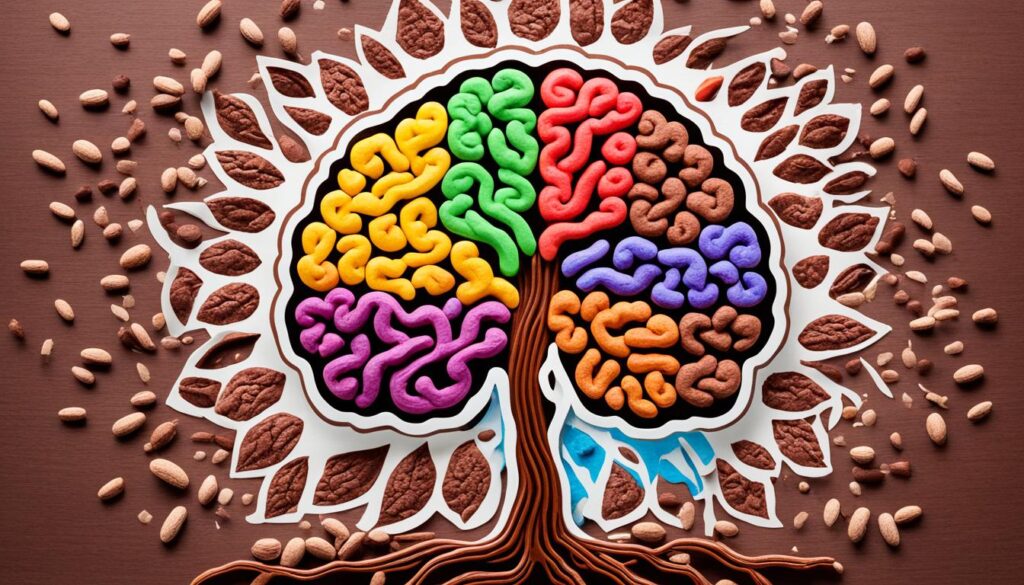Cocoa, the key ingredient in chocolate, has been the subject of increasing scientific interest for its potential benefits on brain health. Numerous studies have suggested that consuming cocoa may positively impact cognitive function, memory, and mood. This is largely attributed to cocoa’s abundance of antioxidants and anti-inflammatory compounds, which may help protect the brain and support its optimal functioning.
Key Takeaways
- Cocoa, the main component in chocolate, has been extensively studied for its potential benefits on brain health.
- Consuming cocoa may enhance cognitive function, memory, and mood.
- The beneficial effects of cocoa are attributed to its high content of antioxidants and anti-inflammatory compounds.
- Cocoa’s neuroprotective properties may help protect the brain and support its optimal functioning.
- Ongoing research continues to explore the intriguing relationship between cocoa consumption and brain health.
Introduction to Cocoa and Brain Health
Cocoa, derived from the cacao plant (Theobroma cacao), has a rich history and has been consumed for centuries, originally by ancient civilizations in Mesoamerica. In recent years, cocoa has gained widespread attention for its potential health benefits, particularly in the realm of brain function and cognitive health.
What is Cocoa?
Cocoa is the key ingredient in chocolate, made from the fermented, dried, and roasted seeds of the cacao tree. It is a complex mixture of hundreds of different compounds, including flavonoids, antioxidants, and various vitamins and minerals.
The History of Cocoa Consumption
The consumption of cocoa can be traced back to ancient Mesoamerican civilizations, such as the Aztecs and Mayans, who revered the cacao plant as a sacred and divine food. These ancient cultures used cocoa in rituals, ceremonies, and as a currency. Over time, the popularity and use of cocoa spread throughout the world, eventually becoming a beloved ingredient in various confectionary and culinary creations.
Cocoa’s Potential Impact on Brain Function
In recent years, the scientific community has increasingly focused on the potential benefits of cocoa consumption on brain health and cognitive function. Numerous studies have suggested that the unique compounds found in cocoa, such as flavonoids and antioxidants, may play a crucial role in supporting brain health, enhancing cognitive abilities, and potentially even reducing the risk of neurodegenerative diseases.
Cocoa’s Beneficial Compounds

Cocoa, the key ingredient in chocolate, is revered for its rich flavor and aroma, but its true value lies in its abundance of beneficial compounds that possess the potential to positively impact brain health. Two of the most prominent and well-studied compounds found in cocoa are flavonoids and antioxidants, which play a crucial role in its neuroprotective effects.
Flavonoids: Nature’s Brain Boosters
Cocoa is particularly rich in a class of flavonoids known as flavanols, which have been extensively researched for their cognitive-enhancing properties. These natural compounds are believed to improve blood flow to the brain, enhance neuronal communication, and promote the growth and survival of brain cells. By optimizing these foundational aspects of brain function, flavanols may contribute to improved memory, learning, and overall cognitive performance.
Antioxidants and Their Role in Neuroprotection
In addition to flavonoids, cocoa is also abundant in antioxidants, such as polyphenols and procyanidins. These potent compounds possess the ability to neutralize harmful free radicals and oxidative stress, which are known contributors to neurodegeneration and cognitive decline. By mitigating the damaging effects of oxidative stress, the antioxidants in cocoa may help protect the brain and support its long-term health and resilience.
| Compound | Potential Brain Benefits |
|---|---|
| Flavonoids | Improved blood flow, enhanced neuronal communication, and neuroprotection |
| Antioxidants | Neutralization of harmful free radicals and oxidative stress, supporting long-term brain health |
How does cocoa consumption affect brain health?

Numerous studies have explored the ways in which cocoa consumption can positively impact various aspects of brain health and function. From enhancing cognitive abilities to improving blood flow and oxygenation in the brain, the potential benefits of incorporating cocoa into one’s diet are becoming increasingly evident.
Cocoa’s Effects on Cognitive Function
Research has shown that the flavonoids and antioxidants found in cocoa can have a profound impact on cognitive function, including improvements in memory, attention, and processing speed. These beneficial compounds have been observed to stimulate the growth of new brain cells, enhance synaptic plasticity, and promote the overall health and resilience of the brain.
Improved Blood Flow and Brain Oxygenation
One of the key mechanisms by which cocoa may benefit brain health is through its ability to improve blood flow and oxygenation to the brain. The vasodilatory properties of cocoa’s flavonoids have been linked to increased cerebral blood flow, which in turn can enhance the delivery of essential nutrients and oxygen to the brain, supporting its optimal function.
Potential Benefits for Neurodegenerative Diseases
Emerging evidence suggests that the neuroprotective properties of cocoa may also have implications for the prevention and management of neurodegenerative diseases, such as Alzheimer’s and Parkinson’s. The antioxidant and anti-inflammatory effects of cocoa have been observed to mitigate oxidative stress and neuroinflammation, two key factors implicated in the development of these debilitating conditions.
Cocoa and Mental Health

In addition to its potential benefits for cognitive function, emerging research suggests that cocoa consumption may also have a positive impact on mental health and emotional well-being. The unique blend of compounds found in cocoa, including flavonoids, methylxanthines, and other bioactive molecules, appear to play a role in modulating mood and stress levels.
Cocoa’s Impact on Mood and Stress Levels
Several studies have explored the relationship between cocoa intake and mood, with findings indicating that regular consumption of cocoa may help alleviate symptoms of depression and anxiety. The antioxidant and anti-inflammatory properties of cocoa are believed to contribute to these mood-enhancing effects, potentially by reducing oxidative stress and inflammation in the brain.
The Role of Cocoa in Promoting Emotional Well-being
Cocoa has also been linked to improvements in overall emotional well-being and life satisfaction. The stimulant effects of compounds like theobromine and caffeine in cocoa may help boost energy and focus, while the serotonin-boosting properties of certain flavonoids may enhance feelings of happiness and contentment. Additionally, the ritual of enjoying a cup of hot cocoa or a piece of dark chocolate may have a calming and comforting effect, contributing to a sense of emotional well-being.
Incorporating Cocoa into a Healthy Diet

To potentially benefit from cocoa’s brain-health properties, it is essential to incorporate it into a balanced and nutritious diet. By thoughtfully selecting high-quality cocoa products and practicing moderation, individuals can enjoy the potential cognitive and emotional advantages that cocoa has to offer.
Choosing High-Quality Cocoa Products
When incorporating cocoa into one’s diet, it is crucial to prioritize high-quality, minimally processed cocoa products. Look for dark chocolate with a high cocoa content, as it tends to be richer in beneficial flavonoids and antioxidants. Avoid heavily sweetened or milk chocolate varieties, as they often contain added sugars and fewer of the beneficial compounds found in pure cocoa.
Additionally, consider exploring raw or minimally processed cocoa powders, nibs, or even whole cacao beans, as these forms can provide a more concentrated source of the beneficial compounds. When purchasing cocoa products, read labels carefully and choose options that are free of artificial additives or preservatives.
Moderation and Balance in Cocoa Consumption
While the potential brain-health benefits of cocoa are promising, it is essential to consume it in moderation as part of a balanced diet. Overindulgence in cocoa or chocolate can lead to undesirable effects, such as weight gain, increased calorie intake, and potential interactions with certain medications.
Experts recommend incorporating cocoa into one’s diet in small to moderate amounts, such as a few squares of dark chocolate or a tablespoon of cocoa powder per day. It is also essential to pair cocoa consumption with a diverse range of nutrient-dense foods, including fruits, vegetables, whole grains, and lean proteins, to ensure a well-rounded and healthy dietary intake.
Research and Clinical Studies

The potential benefits of cocoa consumption on brain health have been the subject of extensive research and clinical studies, yielding promising results, while also highlighting the need for further investigation. A study by Wang et al. (2020) found an association of healthy lifestyle choices, including cocoa intake, with improved cognitive function among Chinese older adults. Similarly, Livingstone et al. (2017) emphasized the importance of dementia prevention, intervention, and care, underscoring the potential role of cocoa in this context.
Exploring the Scientific Evidence
Numerous studies have delved into the relationship between cocoa consumption and brain health. Vauzour et al. (2017) discussed the importance of nutrition for the aging brain and the evidence for an optimal diet, including the potential benefits of cocoa. Dominguez and Barbagallo (2018) focused specifically on the nutritional prevention of cognitive decline and dementia, highlighting the role of cocoa and its bioactive compounds.
Further research, such as the work by Moore et al. (2018) and Flanagan et al. (2020), has explored the impact of diet, nutrition, and specific dietary components, including cocoa, on cognitive function and brain health throughout the aging process.
Limitations and Future Research Directions
While the existing research on the potential benefits of cocoa consumption for brain health is promising, there are also limitations and areas that require further investigation. Vinciguerra et al. (2020) reviewed the influence of Mediterranean and Ketogenic diets on cognitive status and decline, suggesting the need for a more comprehensive understanding of the interplay between dietary patterns and cognitive health.
Additionally, studies like Carrillo et al. (2019) and Ammar et al. (2020) have explored the relationship between cognitive function and the consumption of specific bioactive compounds, such as polyphenols, found in cocoa and other plant-based foods. These findings highlight the potential for further research to elucidate the underlying mechanisms and optimal dosages of cocoa’s beneficial compounds for brain health.
As the scientific understanding of cocoa’s impact on the brain continues to evolve, researchers have also explored other aspects, such as the cognitive effects of acute supplementation with flavonoids (Bell et al., 2015), the molecular mechanisms of bioactive polyphenols on neuromodulation and neurodegeneration (Di Meo et al., 2020), and the potential for microbial metabolites of cocoa’s bioactive compounds to reach the brain (Angelino et al., 2019). These avenues of research underscore the complexity of the relationship between cocoa and brain health, and the need for continued exploration to fully understand its mechanisms and potential applications.
Cocoa and Aging

As individuals age, the potential benefits of cocoa consumption on brain health become increasingly relevant, particularly in the context of cognitive decline and healthy aging. Numerous studies have explored the role of cocoa in promoting cognitive function and overall brain health throughout the later stages of life.
Potential Benefits for Cognitive Decline
Research has shown that the flavonoids and antioxidants found in cocoa may help protect the brain against age-related cognitive decline. Studies have linked flavonoid intake to a reduced risk of dementia, suggesting that incorporating cocoa into a healthy diet could potentially contribute to maintaining cognitive function as we grow older.
Cocoa’s Role in Promoting Healthy Aging
In addition to its potential benefits for cognitive health, cocoa consumption has also been associated with various other aspects of healthy aging. For instance, studies have demonstrated that cocoa can positively influence factors such as blood pressure, insulin sensitivity, and cardiovascular health – all of which are crucial for overall well-being in the later stages of life.
As the global population continues to age, the role of nutrition, including the consumption of cocoa, in supporting brain health and cognitive function has become increasingly important. By incorporating this flavorful and nutrient-rich ingredient into a balanced diet, individuals may be able to take proactive steps towards promoting healthy aging and maintaining their mental sharpness well into their golden years.
Cocoa and Children’s Brain Development

The potential benefits of cocoa consumption may extend beyond the adult population, as research suggests that it may also have positive implications for children’s brain development and cognitive abilities. Emerging studies have begun to explore the impact of cocoa on the cognitive development of young minds.
The Impact of Cocoa on Cognitive Development
Numerous studies have indicated that the consumption of cocoa-derived flavanols and polyphenols may enhance cognitive function in children. These bioactive compounds have been linked to improved attention, memory, and executive function in young individuals. For example, a systematic review highlighted the positive effects of flavonoid and polyphenol intake on cognitive performance in children, drawing from both experimental and epidemiological evidence.
Cocoa and Learning Abilities in Children
In addition to its potential impact on cognitive development, research has also explored the role of cocoa in supporting children’s learning abilities. Studies have suggested that the consumption of flavanol-rich cocoa may enhance various aspects of academic performance, such as memory, attention, and information processing. By supporting the underlying neurological processes, cocoa-derived compounds may help children better engage with and retain educational content, ultimately contributing to their academic success.
As the scientific understanding of the relationship between cocoa and children’s brain health continues to evolve, the incorporation of this versatile ingredient into a balanced diet may offer promising opportunities to support the cognitive development and learning abilities of young individuals.
Conclusion
In conclusion, the existing body of research suggests that cocoa consumption may have a positive impact on brain health, with the potential to enhance cognitive function, memory, and mood. The beneficial compounds found in cocoa, particularly flavonoids and antioxidants, appear to play a crucial role in these brain-health benefits.
Numerous studies have documented the effects of flavonoid and polyphenol consumption, including those derived from cocoa, on improving cognitive performance and counteracting the negative impacts of factors like sleep deprivation. Cocoa-derived polyphenols have been shown to positively affect cognitive function in humans, and flavanol-rich cocoa has been linked to enhancing executive function and working memory.
As the research continues to unfold, the potential of cocoa consumption to contribute to the prevention and management of neurodegenerative diseases becomes increasingly compelling. With its rich history and growing scientific support, incorporating high-quality cocoa into a balanced and healthy diet may be a simple yet effective way to support brain health and overall well-being.

Leave a Reply